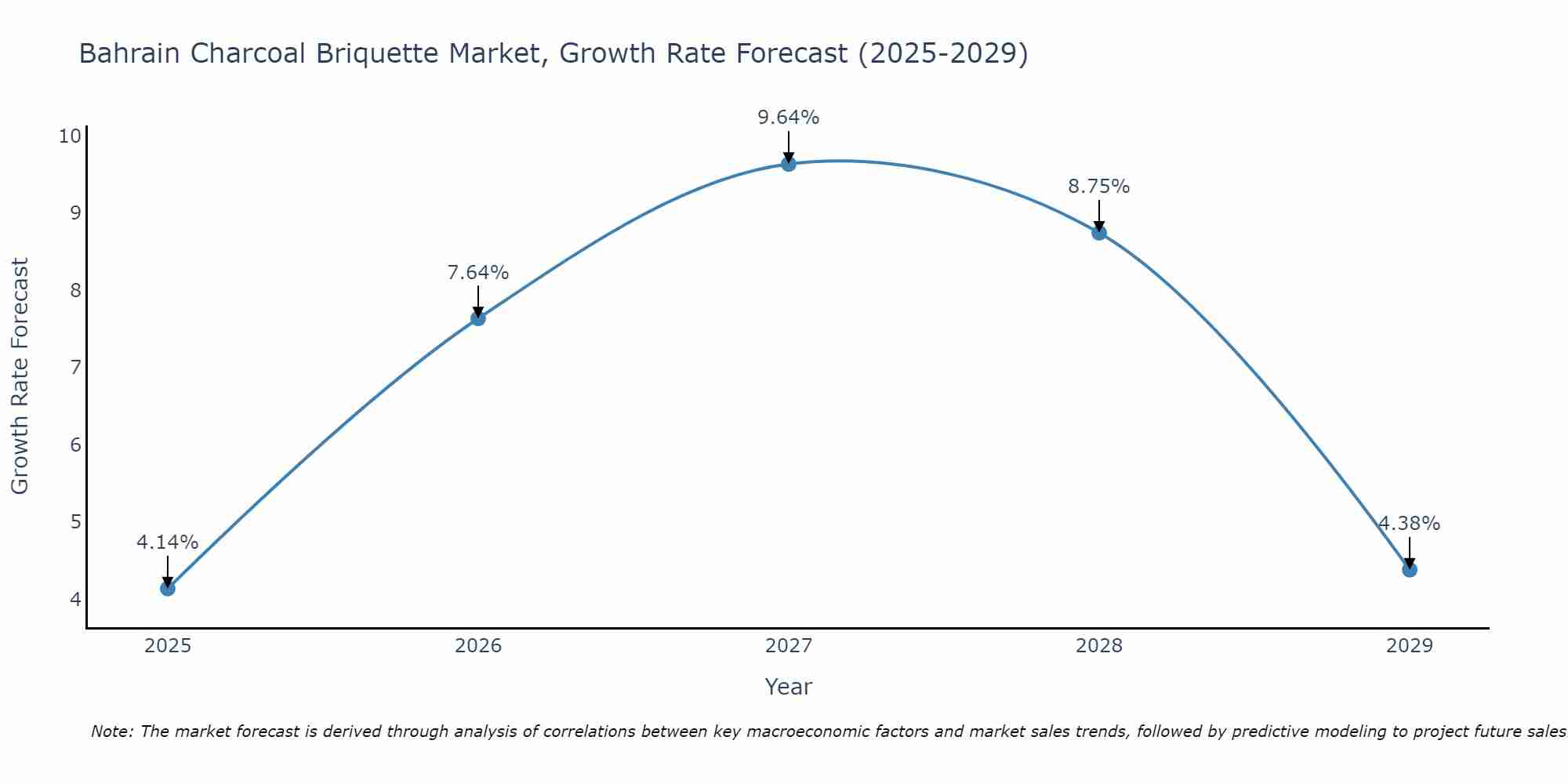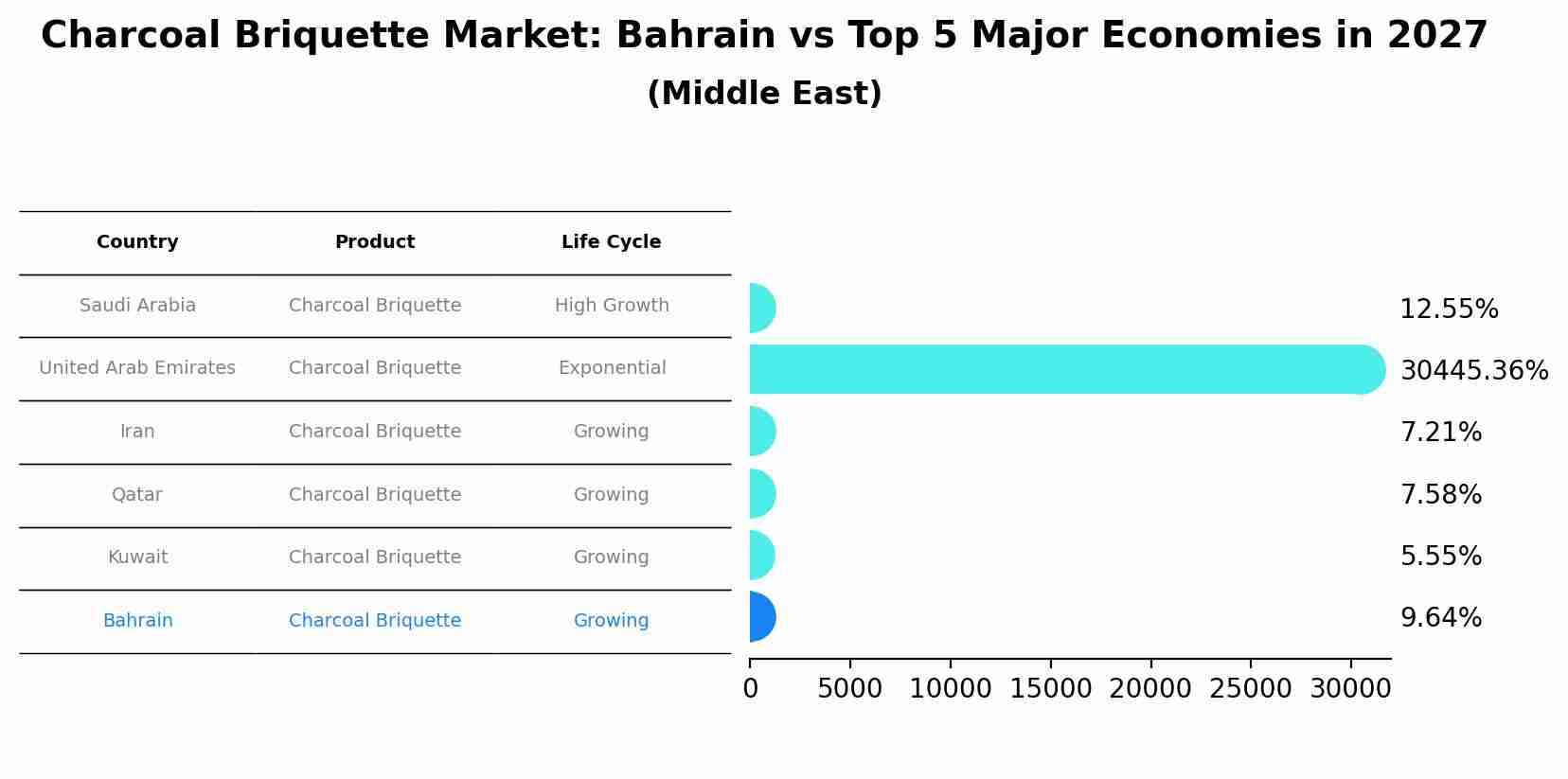Bahrain Charcoal Briquette Market (2025-2031) Outlook | Value, Companies, Revenue, Analysis, Forecast, Industry, Trends, Size, Share & Growth
| Product Code: ETC286544 | Publication Date: Aug 2022 | Updated Date: Apr 2025 | Product Type: Market Research Report | |
| Publisher: 6Wresearch | Author: Sachin Kumar Rai | No. of Pages: 75 | No. of Figures: 35 | No. of Tables: 20 |
Bahrain Charcoal Briquette Market Size Growth Rate
The Bahrain Charcoal Briquette Market is projected to witness mixed growth rate patterns during 2025 to 2029. Starting at 4.14% in 2025, the market peaks at 9.64% in 2027, and settles at 4.38% by 2029.

Charcoal Briquette Market: Bahrain vs Top 5 Major Economies in 2027 (Middle East)
Bahrain's Charcoal Briquette market is anticipated to experience a growing growth rate of 9.64% by 2027, reflecting trends observed in the largest economy Saudi Arabia, followed by United Arab Emirates, Iran, Qatar and Kuwait.

Bahrain Charcoal Briquette Market Overview
The charcoal briquette market in Bahrain is growing due to increasing demand for sustainable and efficient energy sources, particularly in the hospitality and household sectors. Charcoal briquettes, known for their higher energy efficiency and longer burn times compared to traditional wood charcoal, are widely used for grilling, barbecuing, and heating. In Bahrain, the market is driven by the popularity of outdoor cooking and the growing awareness of eco-friendly fuel alternatives. Restaurants, hotels, and households are increasingly using charcoal briquettes as they offer a cleaner and more efficient energy source. The market is expected to expand as demand for sustainable fuel options continues to rise.
Drivers of the market
The Bahrain charcoal briquette market is expanding, primarily due to the demand from the grilling and hospitality sectors. Charcoal briquettes are favored for their long-lasting heat and consistent burning properties. A key trend in this market is the shift toward eco-friendly and organic briquettes made from sustainable materials, such as coconut shells or agricultural waste. Additionally, there is an increasing demand for smokeless and odorless briquettes, which cater to environmentally conscious consumers and commercial users who prioritize clean grilling solutions.
Challenges of the market
The charcoal briquette market in Bahrain faces challenges due to the countrys limited local production of charcoal, which depends heavily on imports. The market demand for briquettes is largely driven by the hospitality and food sectors, but the high cost of importing raw materials and finished products affects pricing and profitability. Additionally, there is stiff competition from cheaper alternatives and an increasing awareness of environmental concerns associated with charcoal production. Local regulations surrounding the production and import of charcoal products can also act as barriers to market entry for new players.
Investment opportunities in the Market
With increasing demand for barbecue, industrial heating, and alternative fuels, the charcoal briquette market in Bahrain presents opportunities for investors. Setting up production or import-distribution networks for high-quality charcoal can be profitable.
Government Policy of the market
Charcoal briquettes are primarily used for barbecue and heating purposes, particularly in the foodservice and retail sectors. While Bahrain imports much of its charcoal, the government regulates environmental and safety standards for combustible materials. Importers must comply with these rules, while entrepreneurs producing eco-friendly briquettes can benefit from sustainability-focused support.
Key Highlights of the Report:
- Bahrain Charcoal Briquette Market Outlook
- Market Size of Bahrain Charcoal Briquette Market, 2024
- Forecast of Bahrain Charcoal Briquette Market, 2031
- Historical Data and Forecast of Bahrain Charcoal Briquette Revenues & Volume for the Period 2021 - 2031
- Bahrain Charcoal Briquette Market Trend Evolution
- Bahrain Charcoal Briquette Market Drivers and Challenges
- Bahrain Charcoal Briquette Price Trends
- Bahrain Charcoal Briquette Porter's Five Forces
- Bahrain Charcoal Briquette Industry Life Cycle
- Historical Data and Forecast of Bahrain Charcoal Briquette Market Revenues & Volume By Type for the Period 2021 - 2031
- Historical Data and Forecast of Bahrain Charcoal Briquette Market Revenues & Volume By Wood Type for the Period 2021 - 2031
- Historical Data and Forecast of Bahrain Charcoal Briquette Market Revenues & Volume By Others for the Period 2021 - 2031
- Historical Data and Forecast of Bahrain Charcoal Briquette Market Revenues & Volume By Application for the Period 2021 - 2031
- Historical Data and Forecast of Bahrain Charcoal Briquette Market Revenues & Volume By Metallurgical Industry for the Period 2021 - 2031
- Historical Data and Forecast of Bahrain Charcoal Briquette Market Revenues & Volume By BBQ for the Period 2021 - 2031
- Historical Data and Forecast of Bahrain Charcoal Briquette Market Revenues & Volume By Others for the Period 2021 - 2031
- Bahrain Charcoal Briquette Import Export Trade Statistics
- Market Opportunity Assessment By Type
- Market Opportunity Assessment By Application
- Bahrain Charcoal Briquette Top Companies Market Share
- Bahrain Charcoal Briquette Competitive Benchmarking By Technical and Operational Parameters
- Bahrain Charcoal Briquette Company Profiles
- Bahrain Charcoal Briquette Key Strategic Recommendations
Frequently Asked Questions About the Market Study (FAQs):
- Single User License$ 1,995
- Department License$ 2,400
- Site License$ 3,120
- Global License$ 3,795
Search
Thought Leadership and Analyst Meet
Our Clients
Related Reports
- Canada Oil and Gas Market (2026-2032) | Share, Segmentation, Value, Industry, Trends, Forecast, Analysis, Size & Revenue, Growth, Competitive Landscape, Outlook, Companies
- Germany Breakfast Food Market (2026-2032) | Industry, Share, Growth, Size, Companies, Value, Analysis, Revenue, Trends, Forecast & Outlook
- Australia Briquette Market (2025-2031) | Growth, Size, Revenue, Forecast, Analysis, Trends, Value, Share, Industry & Companies
- Vietnam System Integrator Market (2025-2031) | Size, Companies, Analysis, Industry, Value, Forecast, Growth, Trends, Revenue & Share
- ASEAN and Thailand Brain Health Supplements Market (2025-2031) | Strategy, Consumer Insights, Analysis, Investment Trends, Opportunities, Growth, Size, Share, Industry, Revenue, Segments, Value, Segmentation, Supply, Forecast, Restraints, Outlook, Competition, Drivers, Trends, Demand, Pricing Analysis, Competitive, Strategic Insights, Companies, Challenges
- ASEAN Bearings Market (2025-2031) | Strategy, Consumer Insights, Analysis, Investment Trends, Opportunities, Growth, Size, Share, Industry, Revenue, Segments, Value, Segmentation, Supply, Forecast, Restraints, Outlook, Competition, Drivers, Trends, Demand, Pricing Analysis, Competitive, Strategic Insights, Companies, Challenges
- Europe Flooring Market (2025-2031) | Outlook, Share, Industry, Trends, Forecast, Companies, Revenue, Size, Analysis, Growth & Value
- Saudi Arabia Manlift Market (2025-2031) | Outlook, Size, Growth, Trends, Companies, Industry, Revenue, Value, Share, Forecast & Analysis
- Uganda Excavator, Crane, and Wheel Loaders Market (2025-2031) | Strategy, Consumer Insights, Analysis, Investment Trends, Opportunities, Growth, Size, Share, Industry, Revenue, Segments, Value, Segmentation, Supply, Forecast, Restraints, Outlook, Competition, Drivers, Trends, Demand, Pricing Analysis, Competitive, Strategic Insights, Companies, Challenges
- Rwanda Excavator, Crane, and Wheel Loaders Market (2025-2031) | Strategy, Consumer Insights, Analysis, Investment Trends, Opportunities, Growth, Size, Share, Industry, Revenue, Segments, Value, Segmentation, Supply, Forecast, Restraints, Outlook, Competition, Drivers, Trends, Demand, Pricing Analysis, Competitive, Strategic Insights, Companies, Challenges
Industry Events and Analyst Meet
Whitepaper
- Middle East & Africa Commercial Security Market Click here to view more.
- Middle East & Africa Fire Safety Systems & Equipment Market Click here to view more.
- GCC Drone Market Click here to view more.
- Middle East Lighting Fixture Market Click here to view more.
- GCC Physical & Perimeter Security Market Click here to view more.
6WResearch In News
- Doha a strategic location for EV manufacturing hub: IPA Qatar
- Demand for luxury TVs surging in the GCC, says Samsung
- Empowering Growth: The Thriving Journey of Bangladesh’s Cable Industry
- Demand for luxury TVs surging in the GCC, says Samsung
- Video call with a traditional healer? Once unthinkable, it’s now common in South Africa
- Intelligent Buildings To Smooth GCC’s Path To Net Zero


















